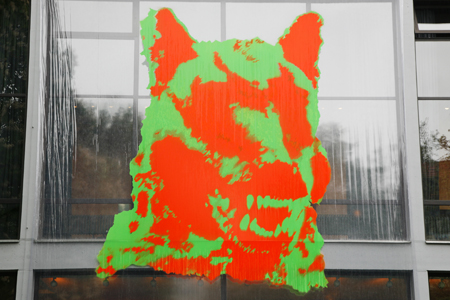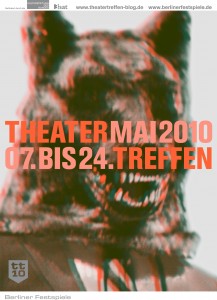Have you heard? Wolves have slowly been returning to Europe. And with them, the public’s fears and expectations have returned as well.

When Wolves Attack. Photo: Kim Keibel
Wolves are to be seen everywhere right now in Berlin – they’re sewn onto T-shirts, they’re hanging on the walls and billboards, and they’re flapping in the wind in front of the windows of the Haus der Berliner Festspiele.
Yes, there are wolves back in Germany and Berlin, and they’re slowly creeping into the Haus der Berliner Festspiele, where Nature (yes, with a capital N) has wandered back into the doors of Culture; where rocks are strewn on the floor of the theater’s foyer and the smell of wood is overwhelming. And while we could certainly discuss this proposition, what interests me is the wolf image of this year’s festival, which is arresting and menacing at the same time.
The image, which originates from Elfriede Jelinek’s play ‚Die Kontrakte Des Kaufmanns,‘ evokes this return to Nature while at the same time suggests one of the larger themes of this year’s festival, namely, ‚crisis,‘ or ‚financial crisis‘ – something that almost everyone is aware of at the moment. With these current events and themes in mind, one could take a second glance at the wolf image and, if one is looking at the poster, one notices that this teeth-gnashing wolf head is on the body of what looks to be a business man. What does this suggest exactly? Is the poster trying to tell us to expect mutants at the festival? That there is a business man and a wolf that have fused together? Or rather is it suggesting a larger problem? That capitalism isn’t a dog-eat-dog world as the cliche goes, but a wolf-eat-wolf one?
While these are certainly ideas that could and should be explored (and they will be in further installments!), I’m more interested now in looking at what this image does to me. First of all, it’s particularly interesting that the image is out of focus, that the contours are not sharp and that the eyes of the wolf/man are like big black holes. From a design perspective, where it’s normally instructed that images be as clear as possible, I find it rather daring that tt10 has put forth such a beautiful and, in a way, provocative poster.

It also strikes me that there are two versions of the poster: one in red and another in green. For those of us who aren’t color blind and who have seen any number of the movies in 3-D in the past couple of years, the memory of those clunky headache inducing glasses doesn’t lie very far away. Indeed, I wonder if we were to put two of the posters together and pop on a pair of 3-D glasses that were permanently ‚borrowed‘ from a movie theater (I plan on returning them, I swear), then perhaps the image itself would pop out at us. This would then gives us, or me at least, the feeling that we’re not as safe from this wolf/man as we would normally like to think, that the wolf is sneaking back into our lives.
This reminds me of an interesting conversation we had today at the tt10 blog editorial meeting, where we discussed the limits of art and theater, and it’s possibility to represent or even extend into reality. Dirk Pilz, a trusty and brilliant mentor, suggested that these questions are provocative and fascinating up to a certain point, namely, death. That is, while Schlingensief can make the viewer confront questions about ailments and while SIGNA can blend the boundaries between fiction and reality in her extreme depictions of violence and other questionable behavior (all couched within an aesthetic environment), where this no longer works is when someone dies. This is where the danger is no longer art. Or, as he phrased it, „death is no longer art but art is absolute up to this point.“
Is there anything to worry about at this year’s theatertreffen? Nah. But maybe we can begin to think a little more about how art and culture play a role in our everyday lives. Certainly a number of the plays suggest such. And perhaps we should listen. What do you think?